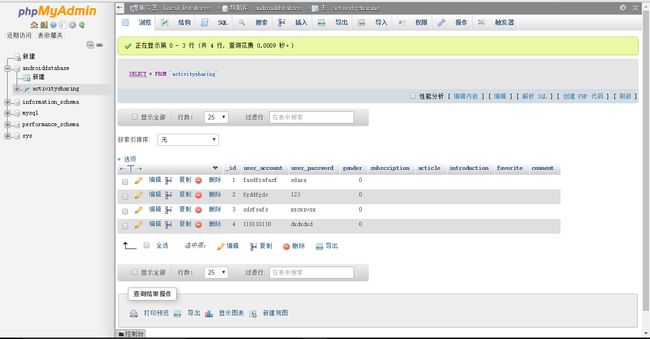【Android】移动端与服务器端简单的交互(账号密码登录) Android+PHP+MySQL
整体的流程是这样的:移动端获取到了数据,然后发送http请求和json格式数据吗,调用php文件,php解析json数据之后,根据数据对数据库进行不同的操作,操作完成之后返回相应,移动端获取响应内容即可知道是否成功。
这里我们就用一个账号密码注册熟悉一下流程,其他的请求与交互都可以在此基础上进行修改。
首先交代一下环境,这里使用的是wampserver ,数据库是androiddatabase,table名是activitysharing,如下图,这里的内容是我之前添加测试的。

服务器端首先配置数据库内容
db_config.php
根据自己数据库名字不同、phpadmin登录密码自行修改
php
define('DB_USER', "root");
define('DB_PASSWORD', "");
define('DB_DATABASE', "androiddatabase");
define('DB_SERVER', "localhost");
?>db_connect.php
用于连接打开数据库的类
/**
* A class file to connect to database
*/
class DB_CONNECT {
// constructor
function __construct() {
}
// destructor
function __destruct() {
// closing db connection
$this->close();
}
/**
* Function to connect with database
*/
function connect() {
// import database connection variables
require_once __DIR__ . '/db_config.php';
// Connecting to mysql database
$con = mysqli_connect(DB_SERVER, DB_USER, DB_PASSWORD,DB_DATABASE);
if ($con) echo "connect complete"."
";
// returing connection cursor
return $con;
}
/**
* Function to close db connection
*/
function close() {
// closing db connection
//mysql_close();
}
}
?>test.cpp
用于接收json数据并对数据库进行操作
define('DEFAULT_STRING', "");
define('DEFAULT_GENDER', "0");
$response =array();
$v=json_decode(file_get_contents("php://input"),true);
if (isset($v['user_account']) && (isset($v['user_password'])))
{
$user_account = $v['user_account'];
$user_password = $v['user_password'];
//gender
if (isset($v['gender']))
$user_gender=$v['gender'];
else $user_gender= DEFAULT_GENDER;
//subscription
if (isset($v['subscription']))
$user_subscription=$v['subscription'];
else $user_subscription= DEFAULT_STRING ;
//article
if (isset($v['article']))
$user_article=$v['article'];
else $user_article= DEFAULT_STRING ;
//introduction
if (isset($v['introduction']))
$user_introduction=$v['introduction'];
else $user_introduction= DEFAULT_STRING ;
//favorite
if (isset($v['favorite']))
$user_favorite=$v['favorite'];
else $user_favorite= DEFAULT_STRING ;
//comment
if (isset($v['comment']))
$user_comment=$v['comment'];
else $user_comment= DEFAULT_STRING ;
// include db connect class
require_once __DIR__ . '/db_connect.php';
// 连接数据库
$db = new DB_CONNECT();
$mysqli= $db->connect();
if ($mysqli) {
echo "connect database succeed";
$result = mysqli_query($mysqli,"INSERT INTO activitysharing(
user_account,
user_password,
gender,
subscription,
article,
introduction,
favorite,
comment)
VALUES('$user_account',
'$user_password',
'$user_gender',
'$user_subscription',
'$user_article',
'$user_introduction',
'$user_favorite',
'$user_comment')");
//创建新账号成功
if ($result){
$response["success"]=1;
$response["message"] = "Account successfully created.";
echo json_encode($response);
}else{
//创建失败
$response["success"]=0;
$response["message"] = "Account can to be created.";
echo json_encode($response);
}
mysqli_close($mysqli);
}
else {
$response["success"]=0;
$response["message"] = "connect failed.";
echo json_encode($response);
}
}
else{
$response["success"]=0;
$response["message"] = "user_account or user_password missing.";
echo json_encode($response);
}
?>由于数据库一开始设置了有很多字段,而很多字段是TEXT类型没有默认值,所以必须对其进行赋默认值。
注意一点的是:由于php版本的不同,在PHP5.5版本之后将mysql系列例如mysql_query、mysql_select等函数在之后用mysqli和pod代替了,具体的可以看php文档,不在这里详细叙述了,不同版本的API还是有些区别的。
服务器端基本就这些了,剩下的是android 移动端。
由于android不允许在主线程中进行http请求所以注意要另开一个线程。还有在android SDK23(6.0)当中,已经取出了org.apache.http中的大部分包,也就是说不在推荐使用httpclient方式进行http访问,而推荐使用HttpURLConnection这个类进行网络操作,是为了更加效率和省电。
new Thread(new Runnable() {
@Override
public void run() {
try {
URL url = new URL(url_new_account);
HttpURLConnection httpURLConnection = (HttpURLConnection) url.openConnection();
//设置请求方式
httpURLConnection.setRequestMethod("POST");
// 设置是否向httpUrlConnection输出,因为这个是post请求,参数要放在
// http正文内,因此需要设为true, 默认情况下是false;
httpURLConnection.setDoOutput(true);
// 设置是否从httpUrlConnection读入,默认情况下是true;
httpURLConnection.setDoInput(true);
// Post 请求不能使用缓存
httpURLConnection.setUseCaches(false);
// 设置请求的超时时间
httpURLConnection.setReadTimeout(5000);
httpURLConnection.setConnectTimeout(5000);
// 设定传送的内容类型是可序列化的java对象
httpURLConnection.setRequestProperty("Content-type", "application/json;charset=utf-8");
httpURLConnection.connect();
//POST请求
OutputStream out = httpURLConnection.getOutputStream();
JSONObject obj = new JSONObject();
obj.put("user_account", account);
obj.put("user_password", password);
Log.v("TAG", obj.toString());
out.write(obj.toString().getBytes());
out.flush();
out.close();
//读取响应
BufferedReader reader = new BufferedReader(new InputStreamReader(
httpURLConnection.getInputStream()));
String lines;
StringBuffer sb = new StringBuffer("");
while ((lines = reader.readLine()) != null) {
lines = new String(lines.getBytes(), "utf-8");
sb.append(lines);
}
Log.v("TAG", sb.toString());
reader.close();
// 断开连接
httpURLConnection.disconnect();
} catch (Exception e) {
Log.getStackTraceString(e);
}
}
}).start();这里注意不同的POST方式所需要的格式和Content-type是不同的,可以参考http://www.cnblogs.com/aaronjs/p/4165049.html